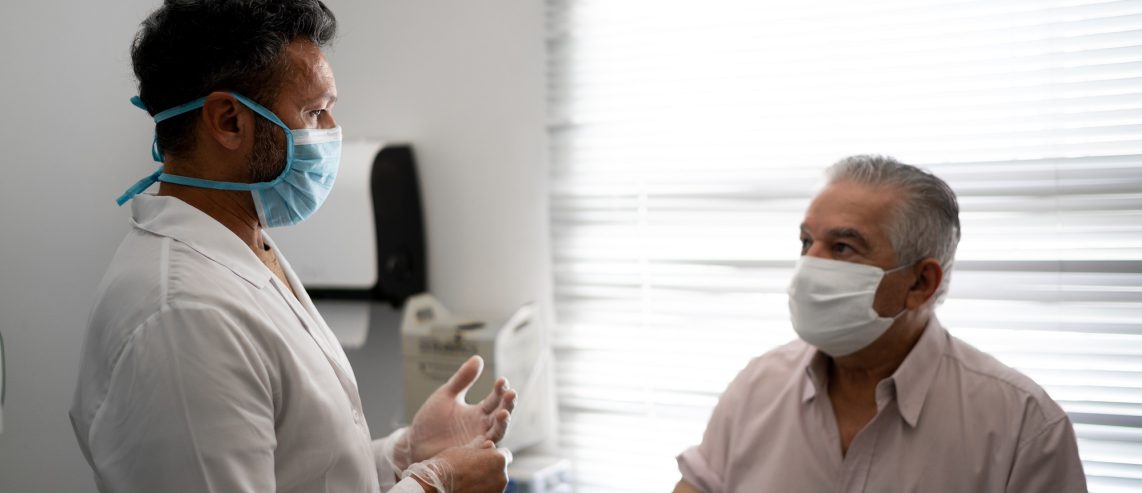If your doctor recommends an outpatient procedure, you may have questions about how to prepare for surgery.
Will you need to fast? Will you receive anesthesia or other medications? And what’s the difference between an outpatient and inpatient procedure?
Here’s what you need to know about preparing for surgery in an outpatient setting.
Never Miss a Beat!
Subscribe to Our HealthBeat Newsletter!
Thank you for subscribing!
You can now select the specific newsletters you'd like to receive.
You are already subscribed.
Subscribe to more newsletters in our email preference center.
Sorry, an error occurred. Please try again later.
Get Healthy Tips Sent to Your Phone!
What Is Outpatient Surgery?
You may feel confused about what the term “outpatient surgery” means. That’s because it has a few other names: ambulatory surgery, office surgery, or same-day surgery. They all mean the same thing — a surgical procedure where you don’t stay overnight in a hospital.
Outpatient surgery can take place in a hospital, a doctor’s office, or at an ambulatory surgery center (ASC). ASCs provide surgery, medical procedures, and diagnostic services outside of a hospital.
What is a common outpatient procedure?
Doctors perform many procedures on an outpatient basis. Some of the most common are:
- Cataract surgery.
- Colonoscopy.
- Ear/nose/throat procedures.
- Endoscopy.
- Gall bladder removal.
- Gynecological procedures.
- Hemodialysis.
- Hernia operations.
- Kidney and bladder procedures.
- Orthopedic procedures.
Preparing for Surgery
As you think about how to prepare for surgery, keep the following in mind:
In the days before your outpatient procedure
Your doctor will give you instructions on how to prepare for surgery. Here are some things they may include:
- Instructions about your prescribed medications. If you take prescription medication, your doctor may want you to stop or change your prescription before surgery. Be sure to bring a list of your prescribed, over-the-counter, and any herbal medications (as well as any known allergies) with you to the outpatient procedure.
- A prescription for antibiotics. To prevent infection, your doctor may give you a prescription for an antibiotic prior to surgery. Be sure to follow any instructions as prescribed.
- Instructions on what to eat and drink. You will probably need to fast (not eat or drink anything) before surgery. Your doctor can tell you exactly how long you need to fast. They will also tell you not to use tobacco or drink alcohol for at least 24 hours before your outpatient procedure.
- Instructions on bathing. Your doctor may ask you to bathe with antibacterial soap or solution the night before and/or the morning of your surgery. You can buy a special antibacterial solution (Hibiclens) at the drugstore or use a commercial brand soap. Bathing with antibacterial soap will cut down on potential germs on your skin, making you less likely to get an infection.
- What paperwork to bring. Have your photo ID and your health insurance information on the morning of the procedure. You may want to bring copies of an advance directive and health care proxy to the surgery center.
- What to leave at home. Don’t bring jewelry or any other valuables with you.
- Instructions for your support person. Plan to have a family member or trusted friend with you on the day of your outpatient procedure. In case the medications you receive make you sleepy or forgetful, your support person can get important post-surgical instructions for your recovery.
- Having someone to drive you home. This can be your support person or someone else. You may not be able to have your procedure unless you have a capable person to get you home afterwards.
The day of your outpatient procedure
Things will go more smoothly if you’re fully prepared when you get to the outpatient center. Here’s what you can do to be ready on the morning of your surgery.
- Skip the deodorant, lotion, perfume, and body spray. These products can make it difficult for doctors and nurses to stick monitoring devices to your skin.
- Bring containers for hearing aids, dentures, contact lenses, or glasses. You will need to remove all of these devices before surgery, so be sure you have somewhere to put them.
- Don’t shave. You don’t need to shave the area where you’ll have the operation. Your medical care team will take care of any area that needs to be clean-shaven.
- Write down any last-minute questions. Now is the time to ask your doctor anything you’re not clear on.
- Remind family and friends to wash their hands. All members of the care team should clean their hands frequently to prevent infection.
After the outpatient procedure
Your doctor will discharge you once you’ve recovered from the anesthesia. Your vital signs must be stable, and you will need someone to drive you home.
Your doctor will give you a list of written instructions for your at-home recovery. It will include things to avoid (like exercise or certain foods) along with a number to call with questions. It will also detail complication signs to look out for.
Don’t hesitate to check in with your medical team with any concerns, no matter how small.
Sources
About UPMC
Headquartered in Pittsburgh, UPMC is a world-renowned health care provider and insurer. We operate 40 hospitals and 800 doctors’ offices and outpatient centers, with locations throughout Pennsylvania, Maryland, New York, West Virginia, and internationally. We employ 4,900 physicians, and we are leaders in clinical care, groundbreaking research, and treatment breakthroughs. U.S. News & World Report consistently ranks UPMC Presbyterian Shadyside as one of the nation’s best hospitals in many specialties and ranks UPMC Children’s Hospital of Pittsburgh on its Honor Roll of America’s Best Children’s Hospitals. We are dedicated to providing Life Changing Medicine to our communities.
